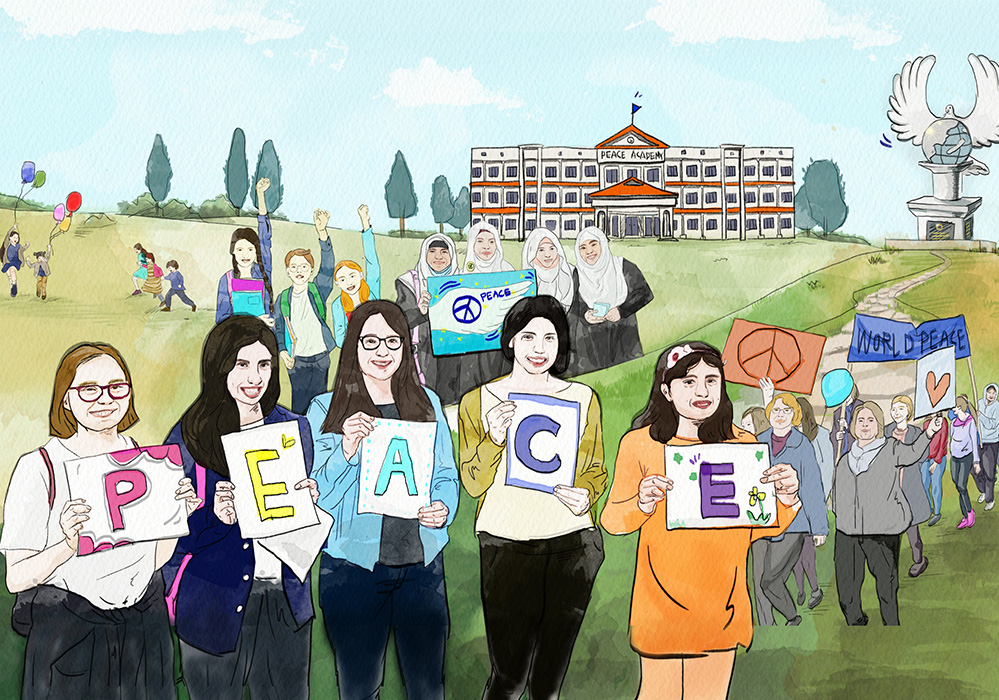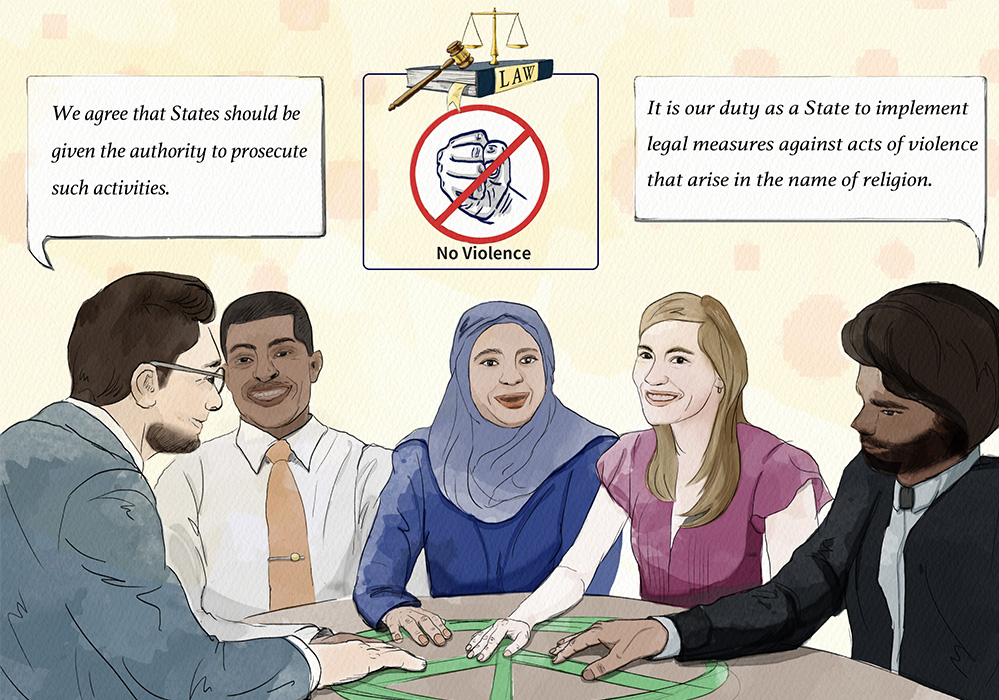Congratulatory Remarks at 2023 HWPL Global Peace Leaders Conference – ①
H.E. Prof. Dr. Emil Constantinescu
3rd President of Romania, Romania

Hon. Chairman Man Hee Lee, Distinguished guests, Dear friends,
I am delighted that we can be together again on another anniversary of the HWPL World Peace Summit. I would like to take this opportunity to look back on the most important moments of my collaboration with our Korean partners and, in particular, highlight what I have learned from this collaboration.
9 years ago, in July 2014, on the occasion of the UNESCO Peace Conference in Paris, the Chairman of HWPL invited me, as President of the Berlin Academy of Cultural Diplomacy, to lend my signature to invitations to political and religious leaders to participate in the signing of the Agreement to Propose the Enactment of International Law for the Cessation of Wars and World Peace and the World Alliance of Religions Agreement. I saw this initiative as a welcome practical demonstration of the potential of cultural diplomacy. From my own experience, I knew just how important understanding between religious leaders is.
In 1998, I organized a major ecumenical conference in Bucharest, titled “Peace is the Name of God”, which was attended by many leading representatives of Christianity (Catholic cardinals, Orthodox Patriarchs, heads of Protestant and neo-Protestant denominations), as well as leaders of Islamic, Jewish, Hindu, Budish and other Eastern religions. From the discussions at the time, I came to realize that those of strong faith can best understand the faiths of others and persuade their followers to live together in peace.
Arriving in Seoul, the impressive number of young people participating in the World Peace Walk made me realize just how strong their desire to live in peace was. I had the opportunity to speak to many of the 100,000 young people who took part in the Olympic Stadium rally on September 16th, seeing how different it was from the rallies that communist dictator Nicolae Ceausescu organized in Bucharest for his own glorification in the vein of Kim Il Sung’s model. Participants in the 2014 Seoul rally, hailing from Korea or from elsewhere in the world, did not attend under either duress or threat. Nor was it political fanaticism that drove them; it was their sincere desire to build a prosperous future for themselves in a democratic society.
Because it is in wars that young men are sent to fight and die; and it is women, as mothers, sisters or daughters, who are left to grieve their deaths. As you know, the HWPL is working closely with two wings – the youth and women’s organizations dedicated to promoting peace, whose rapid expansion worldwide has confirmed the validity of this initiative.
Underdevelopment fosters civil and regional wars. I first visited South Korea in 1994, when Kim Dae-Jung, who was then running for President of Korea, travelled to Bucharest in person to invite me to an International Conference on “Economic and Social Development” being organized in Seoul by the Asia Pacific Democratic Leaders Forum. In my address at this conference, I argued that if people are just trying to survive from today to tomorrow, their ability to think and act freely is greatly limited. As long as you lack any security of life and are subject to abuse and deprivation, Peace cannot resonate with you either politically or morally.

Those of us who were born in Romania at the beginning of the Second World War, who have lived 14 years under Red Army occupation, have known displacement, bombings, famine, political persecution, deportations, crimes of the dictatorship regime and isolation from the rest of the world. From this vantage, we understand our contemporaries in Korea very well. Like us Romanians, those from the other former communist countries of Eastern Europe have also come to admire the way Korea has managed to transform a nation with precious few mineral resources and agricultural land into a technologically advanced and prosperous country that only wants to live in peace.
In 2018, when the Romanian people, with their millennia-long history, celebrated the centenary of the Great Union of our co-nationals from independent Romania with those who had been forced to live under the rule of the Ottoman, Austrian and Russian Empires, the Institute for Advanced Studies in Levant Culture and Civilization alongside the HWPL organized, in May, the “Solidarity of Empathy for Peace” conference in Bucharest, which was attended by the former democratic presidents of Ukraine, Belarus, Croatia, Albania, Bosnia and Herzegovina and by the Deputy Prime Minister of the Russian Federation, who presented their extensive experience in the peaceful resolution of internal and inter-state conflicts.
This was doubtlessly an interesting experience for the large delegation of young Koreans, because, even today, Romanians live as Koreans, divided into two neighboring countries. Fortunately, today relations between Romania and Moldova, both democratic states, are of friendly cooperation.
In September 2018, I returned to Seoul to attend the World Alliance of Religions Peace Summit. In my address at the time, I argued that if, until now, the history of humanity has forever been the “history of war”, we now need to compose a “history of Peace”.
During the Summit, we agreed that Peace is not an abstract concept, but rather a supreme value of humanity that can generate a calm environment in which people can live without the threat of violent conflict or psychological pressure. We agreed to work towards the implementation of concrete measures, both in the short but above all in the long term, in order to fashion a new system of reference that replaces attitudes of “man against man” with “man alongside man”, expressed in the motto we adopted in 2014, “We are one.”
Just as our hopes for world peace were gaining momentum, the Russian Federation’s unprovoked aggression against Ukraine, unleashed in February 2022, led to the deaths of hundreds of thousands of young people and to the injury of hundreds of thousands more. It has caused the extensive destruction of both material and immaterial assets, with both immediate and long-term consequences in causing a global food and energy crisis as well as a huge involuntary migration of millions of refugees. Every single one of the human rights that the International Commission on Human Rights has pledged to protect have, by now, been violated, a development which threatens everything that has been built up by the existing world order predicated on the rule of law.
How can we explain this sudden and violent degradation of all that once seemed to have been achieved in the struggle for world peace? Have we made a mistake along the way? Have we not done enough? I do not believe that this is where the causes lie; but, rather, in the fact that we have not yet realized just how many conflicts there are in different parts of the world, and how difficult it is to resolve them peacefully.
In this light, I welcome the presence in Seoul of senior political figures from Africa, Asia and South America, who can share their particular experiences with us. However, above all else, we have not yet realized just how difficult it is to transform mentalities, to win both hearts and minds. We should have considered why the history of humanity has, for millennia, continued to be a history of war instead of a history of peace, and why, in the consciousness of humanity, our greatest heroes are lords of war, and not lords of peace.
Unfortunately, even economically developed countries with advanced democracies have problems with social violence – children and teenagers are constantly assailed by the widespread propagation of violence through cinema, television, mass media and social networks, providing a ripe environment for the orchestration of hatred.

A culture of peace can only be achieved through an educational process that rejects violence – not only in the resolution of military, political and economic disputes, but also as a way of attaining unanimously accepted values such as freedom, truth and justice, from which a just peace cannot be separated. It is necessary to recall the lessons of recent history, where, in Eastern Europe, the solidarity of enormous masses of people around the ideals of freedom, truth and justice led to their realization in practical terms, by peaceful means.
The culture of peace is not a short-term remedy. Instead, it is a lengthy journey “from darkness into light”, which can only be achieved through a complex and lengthy educational programme that spans all the way from childhood to old age, applies to society as a whole, and is taken up as a personal ideal by as many people as possible.
Over seven decades ago, at the end of World War II, the preamble to the Founding Declaration of UNESCO (the United Nations Educational, Scientific and Cultural Organization) warned us that, “since wars spring from the spirit of men, it is in the spirit of men that the foundations of peace must be laid.” Here, we find echoed the ideas of Lao Tse, who argued that, “in order for there to be peace between neighbors, harmony must first reign in the family; in order to have peace in the home, one must find it in one’s own heart.”
We find ourselves upon a crossroads, where the Second Cold War has taken hold of the world. We find ourselves in the presence of a deadly regional war, and under the threat of a nuclear cataclysm with global consequences. We find ourselves in a time when the escalation of military, political, ideological, economic, social and cultural conflicts in different parts of the world has reached such heights that it would appear that World Peace can, now, only be achieved by a miracle.
And yet, contrary to the European perspective that miracles are supernatural, unpredictable phenomena, an old proverb drawing upon ancient Korean wisdom, says that ‘a miracle is synonymous with perseverance’. We sorely need such perseverance in our actions, now more than ever, so that the “Miracle of World Peace” can be born from the hopes that brought us together nine years ago in Seoul.















